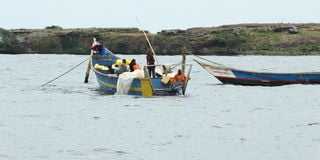Kalangala revives safety decree passed 7 years ago

An engine boat similar to the ill-fated craft which capsized on Wednesday docks at Lwanabatya Landing Site in Kyamuswa County, Kalangala District in August. PHOTO / Ivan Walunyolo
What you need to know:
Brutal awakening. Political leaders, fishermen, security officials and the general public are singing the same tune on marine safety following a consistent pattern of accidents on the country’s largest water body in which a larger percentage of travellers perish.
Following Wednesday morning’s shocking tragedy, authorities in the Lake Victoria island district of Kalangala have accepted some blame for this and many other accidents on the country’s largest water body.
A senior district leader said their failure to enforce safety regulations has contributed to many deaths on the lake, including the 25 souls believed to have perished early Wednesday morning..
Kalangala District chairman, Mr Rajab Ssemakula, told Daily Monitor yesterday that there is a water safety Ordinance in place which, unfortunately, has gone largely unenforced for years. Many lives would have been saved if that by-law was strictly applied, he suggested.
“It is an indictment on us the leaders when our people are dying and we fail to get a solution. As a district, we are going to work closely with marine police to ensure that the already existing ordinance on water transport safety management is fully enforced,” he said.
Seven years ago, leaders from the Kalangala Island chain passed a by-law to regulate water transport in their wide area of jurisdiction.
The Ordinance was one of several measures put in place in response to rising deaths of people and loss of cargo while in transit to the mainland.
In it was an order for all passenger and cargo boats traversing Lake Victoria to acquire water/sea worthy certificates before being cleared to operate.
A water worthy certificate is one of the minimum requirements provided for by the Ministry of Works and Transport for any passenger or cargo boat plying a given route.
The Ordinance also required every passenger boat operator to fit his craft with life-saving jackets to ensure safety of travellers. Each boat operating in the area was also supposed to have a waste management disposal plan.
However, majority of boat operators on the Victoria have continued to transport passengers and cargo without fulfilling any of the requirements stipulated under the Ordinance.
The ill-fated boat, according to police, was packed with charcoal, fresh foods, silverfish and at least 34 passengers en route from Lwanabatya Landing Site in Kyamuswa Sub–county to Kasenyi on mainland Entebbe in Wakiso District.

Women gather at a landing site to mourn colleagues who died after a boat capsized on Lake Victoria on Wednesday. PHOTOs/IVAN WALUNYOTO
Only nine people survived the accident after the boat was blown many nautical miles off course in a severe windstorm before it capsized. By Thursday evening, police and army marine teams had recovered three bodies from the lake.
Mr Ssemakula said the laxity by community leaders at landing sites and within the district leadership is to blame for the current situation of non-compliance with the law.
“We are going to fast-track this [ensuring that boat operators have valid skipper’s certificates] and ensure that we bring sanity on the lake,” he added.
Unlike on ferries and other large water vessels where passengers’ particulars are captured before boarding, traditional, private wooden boat operators keep no records.
Mr Ssemakula said they will now work closely with leaders of fishing folk at every landing site to ensure that passengers’ records are available before setting off.
“We have realised that this is also another big challenge. In case of a disaster like this, we shouldn’t be struggling to know who were on the boat like we are doing now. We have do away with such a primitive way of looking at things,” he said Records at Kalangala District Police Station indicate that, on average, six fatal boat accidents are recorded in the area every year. However, several others go unreported.
Currently, the district has three government-owned large marine vessels: MV Kalangala that plies the route between Nakiwogo–Entebbe, Lutoboka; MV Pearl and MV Ssese, which operate between Bukakkata in Masaka and Luku-Bugoma in Kalangala.
There are also some private vessels plying the Entebbe-Kalangala route like MV Vanesa, MV Natalie, MV Brovad and SENCATA.
All these ferries dock on Bugala Island, leaving the rest of Kalangala’s 63 islands with no reliable means of safe transport. Travellers wishing to use the ferries brave the risky boat ride on usually rough lake waters to Bugala. Others ride the same boats all the way to the mainland
This makes for a serious problem since majority of Kalangala’s population lives on the outlying islands, the furthest of which remain inaccessible. The area economy is, therefore, hampered at transportation of fish and other goods, including oil palm and rice to the mainland is difficult.




